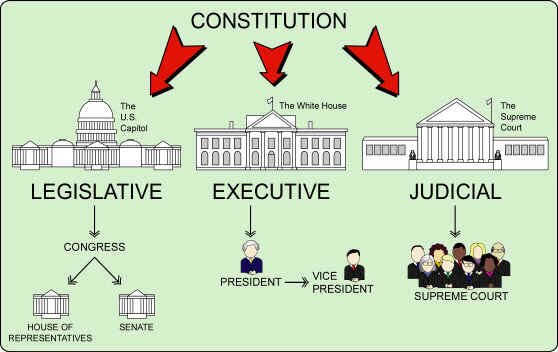Executive Branch Not The Most Important Branch and History Changing Presidents
The executive branch is not the most important branch of the government in the USA. Even though there is the checks and balances system to ensure an equal amount of power among all three branches, the Legislative branch is by far the most important.

The Separation of Powers was created by the framers of the Constitution and was designed to do one primary thing: “to prevent the majority from ruling with an iron fist”. They wanted to avoid giving any branch of the new government too much power. The separation of powers provided a system of shared power known as Checks and Balances.
Three branches are created in the Constitution. The Legislative, composed of the House and Senate, is set up in Article 1. The Executive, composed of the President, Vice-President, and the Departments, is set up in Article 2. The Judicial, composed of the federal courts and the Supreme Court, is set up in Article 3. Each of these branches has certain powers, and each of these powers is limited, or checked, by another branch. For example, the President appoints judges and departmental secretaries. But these appointments must be approved by the Senate. The Congress can pass a law, but the President can veto it. The Supreme Court can rule a law to be unconstitutional, but the Congress, with the States, can amend the Constitution. By forcing the various branches to be accountable to the others, no one branch can hold enough power to become dominant.
The Executive branch is overlooked, and controlled, by the President. The President appoints the Cabinet members. His job is to also approve the laws that Congress makes. When the Senate and the House approve a bill, they send it to the President. If he agrees with the law, he signs it and the law goes into effect. If the President does not like a bill, he can refuse to sign it. However, the President cannot write bills but he can purpose a bill. Basically, the Executive branch has the power to veto a bill, to appoint judges and other officials, to make treaties and to ensure that all laws are carried out.
On the other hand, the Legislature branch can pass all federal laws, establish all lower federal courts, override a Presidential veto and can impeach the President. Yes, The Legislative branch has equal power to all of the other branches of government by the checks and balances system, but is rather more significant. It impacts the people more directly, with all the bills and laws that it creates. It is truly the part of government that is “for the people”.
Two presidencies with two different congressional terms are Abraham Lincoln, and Thomas Jefferson. Abraham Lincoln, was elected as the 16th President and had a large impact on the country. Linco
 ln had the task of uniting the states once the North won the war, with his leadership during the Civil War. Furthermore, he helped keep the union together an
ln had the task of uniting the states once the North won the war, with his leadership during the Civil War. Furthermore, he helped keep the union together an d eventually led to the abolition of slavery in the United States. "I am a firm believer in the people. If given the truth, they can be depended upon to meet any national crisis. The great point is to bring them the real facts." (http://www.karemar.com/blog/top-10-united-states-presidents-all-time) On the other hand, Thomas Jefferson, was elected as the third President of America and he was also very important. His decision to execute the Louisiana Purchase helped nearly doubled the United States size overnight. Jefferson “realized the need for consolidating power in the federal government when necessary”. "I tremble for my country when I reflect that God is just; that his justice cannot sleep forever. . . the Almighty has no attribute that can take side with us in such a contest." (http://www.karemar.com/blog/top-10-united-states-presidents-all-time). These two presidents were very similar. They were both able to impact the country and change history firsthand. The one main difference was how they changed the lives of the Americans and the country. They both helped to create out country as we know it today. Kudos to them.
d eventually led to the abolition of slavery in the United States. "I am a firm believer in the people. If given the truth, they can be depended upon to meet any national crisis. The great point is to bring them the real facts." (http://www.karemar.com/blog/top-10-united-states-presidents-all-time) On the other hand, Thomas Jefferson, was elected as the third President of America and he was also very important. His decision to execute the Louisiana Purchase helped nearly doubled the United States size overnight. Jefferson “realized the need for consolidating power in the federal government when necessary”. "I tremble for my country when I reflect that God is just; that his justice cannot sleep forever. . . the Almighty has no attribute that can take side with us in such a contest." (http://www.karemar.com/blog/top-10-united-states-presidents-all-time). These two presidents were very similar. They were both able to impact the country and change history firsthand. The one main difference was how they changed the lives of the Americans and the country. They both helped to create out country as we know it today. Kudos to them.Other Sources:
http://www.library.thinkquest.org/J0110221/
http://www.leinsdorf.com/Presidents.htm
http://www.voteutah.org/learning/government/three_branches.html

0 Comments:
Post a Comment
Subscribe to Post Comments [Atom]
<< Home